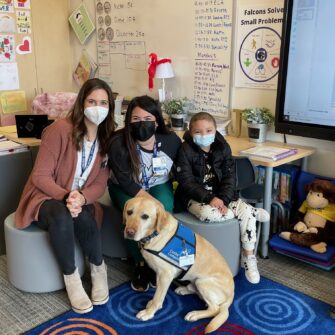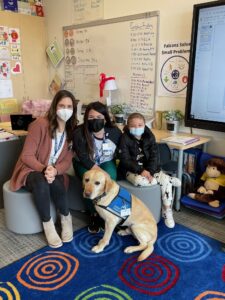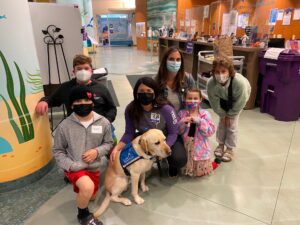
Celebrating Child Life and Social Work Month
Pokes, tests and lots of waiting are commonplace at the doctor’s office or hospital. What can make things a little better, especially for kids and their families, when visiting MultiCare Mary Bridge Children’s Hospital?
Child life specialists and pediatric social workers.
March is nationally recognized as both Child Life Month and Social Work Month, so we talked to our child life and social work teams from Mary Bridge Children’s hematology-oncology clinic. Together, these nonmedical teams collaboratively support patients and families at all stages of their journeys — both in and out of hospital and clinic walls.

Pediatric social worker Valaree Schelhammer (left) and child life specialist Kristen Bishop at a patient’s classroom visit.
“Child life focuses on helping kids by normalizing the childhood experience as they’re in the hospital,” says Kristen Bishop, senior child life specialist at Mary Bridge Children’s. “We do this in many ways, primarily through play and developmentally appropriate education. Our goal is to minimize the stress and trauma that comes with medical treatments by offering tools and facilitating interventions for the patients and their families.”

Social worker Jessica Pabst (left) and child life specialist Kristen Bishop with Olaf, the facility dog, and a patient at a classroom visit.
Pediatric social work also aims to support patients and families, but from a psychosocial and behavioral health perspective.
“As social workers, we work to understand the patient’s social determinants of health, which help us connect them to appropriate resources for mental health, as well as connect them to patient assistance programs, wish-granting organizations and therapeutic interventions to ease the stress and complications of a hospital stay,” says Valaree Schelhammer, pediatric hematology-oncology social worker at Mary Bridge Children’s.
A one-team approach to care and support
Together, child life specialists and pediatric social workers collaborate with interdisciplinary teams, providing stability, emotional support and problem-solving assistance to the whole family.
In addition to supporting patients through appointments, procedures and hospital stays, both teams advocate for patients outside of the hospital.
“One of the things that both child life and social work teams collaborate on are our classroom visits,” says Bishop. “Especially for patients who are dealing with cancer, we visit their classroom and provide age-appropriate presentations about what cancer is and what treatment and recovery might look like for their classmate. This education helps to build both empathy and confidence for our patient as well as their classmates.”

Child life specialist Kristen Bishop (middle) and Olaf, the facility dog, gather with members of the Discoveries support group.
“The classroom visits are especially helpful for patients who may look physically different due to treatment like chemo or amputations,” says Schelhammer. “It takes a lot of pressure off of the patient if we can explain why they might not have hair, or might be absent often, or why it’s important to practice good hand hygiene and stay home when they themselves are feeling sick. It helps to alleviate misconceptions and set our patient up for the most success.”
Mary Bridge Children’s child life specialists and social workers also offer family support groups and are often the first point of connection to outside resources in the community, from counseling services to psychosocial needs, financial aid and more.
Both services are offered at no charge to families at Mary Bridge Children’s, and many patients have long-standing relationships with their child life specialist and social worker. Support and learn more about child life and social work at Mary Bridge Children’s.